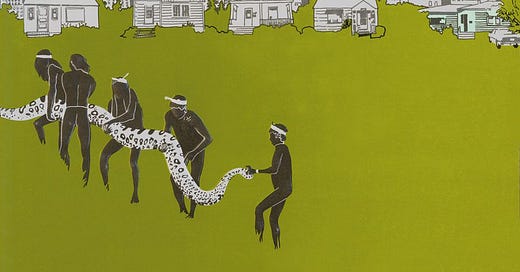“Nobody has ever made an album like this.” —David Bennun
LIKE A COMET THAT RETURNS unannounced for another pass at the Sun, I return to Joni Mitchell’s musical catalog again and again. To ride the black keys.
This is a funny custom. I can’t predict its arrival. Sometimes years will pass. And then—suddenly—I’m steeping again.
The albums that comprise my Mitchell emersions are For the Roses, Court and Spark, The Hissing of Summer Lawns, Hejira, and parts of Don Juan’s Reckless Daughter. Prior to and post this set of albums I don’t tarry.
The painful thing about listening to prime Joni Mitchell is how her compositions remind me of modern pop’s tragic shortcomings.
Unless deliberately retrogressing into the past, current generations miss the opportunity to develop their aesthetic standards. To go up against the primordial Mother or Father. Topographical creations by demiurges like Mitchell, Stevie Wonder, Laura Nyro, and Van Morrison. To name a few.
These artists call to mind the mysteries attendant art-making—something worth striving towards—if you are an artist. Not as many of those today. Skilled Garage Band mavens? Check! And keen auto-tuned vocalists? Check! But no Pierre Teilhard de Chardins of pop. No Mitchells.
As a teenager and then into my twenties, both Mitchell and Wonder provided spiritual templates that became touchstones—homing devices that I used—first as a maturing human and then as a struggling and growing artist—to maneuver my way onward.
Especially Mitchell, who created an emotional lexicon that expanded way beyond her albums’ librettos. I’m thinking of her guitar’s open tunings. And also the uncanny multitracked harmony vocals that distinguished many of her most memorable songs. Always as interludes (more like fantasias) disrupting the song’s traditional verse-chorus sequence.
Some would say her peculiar musical idioms are taken for granted today. Or, like a blind spot, they are missed entirely. However, I think it’s more about how those sounds made people feel. Unresolved. And that could be a problem.
Some of those sounds are feral and not part of the Western musical canon. They explore weird terrains (weird: from Shakespeare’s witches in Macbeth). Sounds that were once called ‘the devil’s chords’. Forbidden notes because they do not settle along the heptatonic scale. Mitchell calls them ‘chords of inquiry’. But I’ve always heard in them something occult. Not dark necessarily, but not for the masses.
I remember watching a documentary on Mitchell with my mom years ago. And during some old footage where Mitchell started to play the song ‘Woodstock’ on her piano, my mom, a musician herself, leaned towards the television and said, “Listen! Listen how she’s focused on the black keys.”
The black keys. The modifiers that comprise the eerie pentatonic scale (a musical scale with five notes per octave). A scale developed long ago by ancient civilizations. Not for the masses.
All of Mitchell’s strange notes and inquiries outlined my interior life when I was busting out of my teens. Out of the closet. Out and about—a budding ponce—out and about—prowling for sex and discovering Tim.
Timothy was a serious and soft-spoken introvert. A blond Swede top to bottom, with a forest of golden hair all atop his forearms—even on his knuckles. He worked as a glassblower in Laguna Beach. “A real artist,” I commended myself.
Our arrangement was what my posse of queer friends called an ‘older for younger’ thing. This was before titles like Daddy and Twink dominated the homo argot.
I was nineteen, and we’d met at a queer seaside club that featured a jukebox programmed with old 60s and 70s Motown hits. Songs that, regardless of the selection, swept everyone into a bubble of pure pleasure on the dance floor.
Tim, a high-octane romantic, would make me eccentric mixtapes. Odd choices and quirky segues of songs I’d never heard but intermixed with just enough of the familiar to keep me listening. Where are those tapes now?







